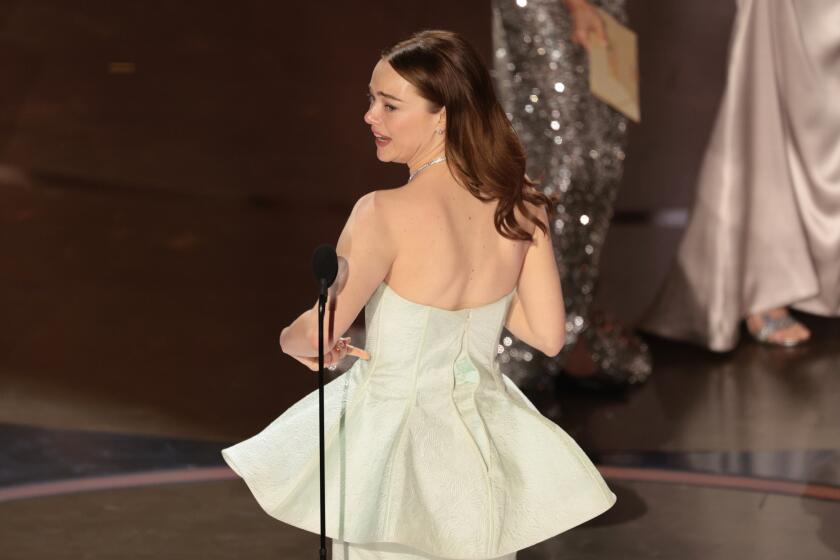Found in ‘Yonkers’ : Simon, Coolidge and Cast Discover Mutual Respect
Martha Coolidge was showered with screenplays after directing “Rambling Rose,” her critically acclaimed 1991 film about a Georgia family of the 1930s, which earned Oscar nominations in both the best actress and best supporting actress categories.
But when she received Neil Simon’s screen adaptation of his 1991 Pulitzer Prize-winning play, “Lost in Yonkers,” she immediately felt an affinity with the New York playwright who was once known more for frothy comedies than for character-driven dramas.
“I read the first page of Neil’s script, and I knew I wanted to direct it,” Coolidge said. “You don’t get dialogue like that in movies anymore. It’s priceless. You can’t buy that kind of characterization.”
Opening Friday, “Neil Simon’s Lost in Yonkers” tells the story of two boys, Jay and Arty (newcomers Brad Stoll and Mike Damus), who go to live with their stern and emotionally repressed German-born grandmother (Irene Worth) in 1942 while their widowed father (Jack Laufer) takes a wartime job that requires constant travel.
Also living in the cramped apartment just north of New York City is Aunt Bella (Mercedes Ruehl), an eccentric slow-learner who has spent most of her life taking care of her ungrateful mother. Bella’s hoodlum brother, Louie (Richard Dreyfuss), hoping to elude a gangster named Hollywood Harry (Robert Guy Miranda), suddenly shows up to take refuge under his mother’s roof.
Both Worth and Ruehl won Tony Awards for creating their roles onstage.
For Simon and Coolidge, transforming “Yonkers” into a film required finding ways to “open up” a play set entirely in Grandma Kurnitz’s living room. Nearly half the movie, on the other hand, takes place out of doors, and Simon has trimmed some of the monologues and added characters who were only offstage figures in the play. The most important of these is Johnnie (David Strathairn), the retarded movie theater usher who seems to offer Bella a means of escape.
But since the story is told mainly from the boys’ perspective, Coolidge wanted to retain the feeling of confinement. “The metaphor of the piece is that it is a prison . . . Hansel and Gretel’s entrapment in the gingerbread house or Cinderella in her stepmother’s house,” the director said. “There are a lot of fairy-tale images to it, but I wanted it to feel real.”
So after spending five weeks on location in the Cincinnati area-- chosen for its resemblance to the Yonkers of the ‘40s--the cast and crew found themselves navigating through a rabbit warren of tiny drab rooms constructed on a Culver City soundstage.
Oblivious to the between-scenes bustle around him, Simon, sitting on a stool, worked in longhand on his next play, “Laughter on the 23rd Floor,” which will star Nathan Lane as comedian Sid Caesar. “Laughter” is not expected to open until next season, but “Yonkers” producer Ray Stark already has plans to turn it into a movie. That film will be Stark’s 12th collaboration with Simon. All but two of these films--”The Slugger’s Wife” (1985) and “Brighton Beach Memoirs” (1986)--have made money, according to the producer.
Despite the failure of “Brighton Beach Memoirs,” the first part of Simon’s autobiographical trilogy, Stark went on to produce the sequel, “Biloxi Blues” (1988), which became one of their biggest successes, along with “Murder by Death” (1976), “The Goodbye Girl” (1977) and “The Cheap Detective” (1978). The producer, who expects women audiences to be drawn automatically to “Yonkers,” feels the key challenge will be to attract men to the $17-million film.
Able to easily shift gears, Simon was often at Coolidge’s elbow during rehearsals--at one point, for example, reminding Dreyfuss of what he is actually seeing when he looks out a window, at another involving himself in a discussion about how to choreograph the actor’s movements. “It looked like it was getting slow there,” the bespectacled playwright said afterward.
Like others on the set, Simon praised Coolidge for being self-assured yet willing to listen. “What’s wonderful with her, for me, is that I am able to talk without having to worry that I’m imposing on her directorial domain,” said the writer, whose relationships with directors have not always been that smooth. For instance, in January, a long-simmering conflict between Simon and Gene Saks, the director of the play “Lost in Yonkers,” came to a boil when Saks was replaced as director during the pre-Broadway run of Simon’s musical version of “The Goodbye Girl.”
Although an admirer of “Rambling Rose” and other Coolidge films, including her 1985 comedy “Real Genius,” Simon said the two conversations they had were decisive in getting Coolidge the “Yonkers” assignment. “She understood what this play was all about,” he said.
Coolidge said she was grateful that Simon was available much of the time to do instant rewrites. “He’s always working. He’s always asking, ‘Can I make it better?’ ” she said admiringly. At the same time, she noted, “he was extremely respectful of my space.”
The red-haired director, 46, said she had no trouble relating to the German-Jewish Kurnitzes, despite a background that includes a distant connection to President Calvin Coolidge. The daughter of architects, she was born in New Haven, Conn., while her father was teaching at Yale.
“I have personal associations, as do so many people, that go with this piece,” she said, recalling an experience she had at age 8. “My grandmother took me and my sister and my brother in when my father was dying (while) my mother took my father off on his last trip. I was surrounded with loss, and I knew something terrible was happening.” Her grandmother’s house was “very foreign,” Coolidge added. “She was tough. But later when I became an adult I loved her.”
Waiting to embark on a crucial confrontation with Grandma Kurnitz, Ruehl, in seamed stockings and platform shoes, talked over the characters’ interaction with Simon and Coolidge. “It’s almost as if she (Grandma) had to wait till I was ready to leave the house before she could cough up a little vulnerability,” she theorized.
When the actress took her position, Simon said, “What’s interesting to me is that after playing the role for nearly a year she’s still investigating it.”
Both Worth and Ruehl said they found it challenging to adapt their theater performances to another medium. The winner of two other Tonys (“Tiny Alice” and “Sweet Bird of Youth”), Worth much prefers working on the stage, where 5 a.m. wake-up calls are nonexistent and scenes are played in proper sequence. “It’s quite terrible,” the veteran actress confided.
Ruehl said the experience has taught her that stage and film do not demand two different kinds of acting. “I discovered you can pretty much do a theatrical performance on film,” she said. “What’s interesting about film is that it opens up a whole other area of subtlety that the conditions of working in a 1,500-seat theater don’t allow. You can whisper, you can raise an eyebrow, and change the world.”
Ruehl, whose selection as Bella was assured when she landed an Academy Award for best supporting actress for “The Fisher King” (1991), said she valued Coolidge’s psychological acuity--her ability, for example, immediately to understand the rage that had built up inside Bella, despite the character’s outwardly obliging demeanor. “Gene Saks staged the play brilliantly and dealt with their characters and their motivations brilliantly, but there’s just a certain intimacy and understanding among women that makes for a certain kind of shorthand,” the actress added.
Good word-of-mouth while “Yonkers” was still in production has made Coolidge one of Hollywood’s busiest women directors. Without taking a break, she is about to start production in New York on “Angie, I Says,” a contemporary comedy starring Geena Davis. Future projects include an as-yet-untitled film about ex-Black Panther Johnny Spain, who was involved in a deadly San Quentin prison escape attempt, and a movie based on Joyce Carol Oates’ “You Must Remember This.”
Although she feels 1992 was a “uniquely mediocre year for women,” she was not upset--unlike some other women in the industry--that the Academy of Motion Picture Arts and Sciences chose to mark it as the Year of the Woman during the Oscar ceremony in March.
“I wasn’t personally offended,” Coolidge said. “It was too bad it was a poor year, but they didn’t plan it that way. It just shows how fragile and tenuous is the hold that women have in this industry--that it could just disappear for a year.”
More to Read
Only good movies
Get the Indie Focus newsletter, Mark Olsen's weekly guide to the world of cinema.
You may occasionally receive promotional content from the Los Angeles Times.






